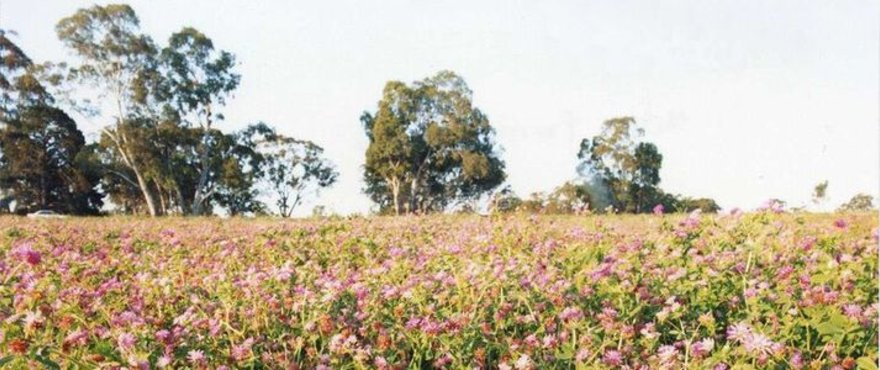Download a copy of the Nitro Plus Persian Clover factcsheet.
Nitro Plus (Trifolium resupinatum var. resupinatum) is a hard seeded Persian clover that has a semi-prostrate growth habit and demonstrates early to mid season maturity. This will offer large benefits to growers in medium rainfall cropping zones, where pasture options are normally restricted to either Medic or early maturing sub-clover varieties for pasture rotations. It has an indeterminate flowering habit and can take full advantage of unseasonal rains late in the season. Nitro Plus produces a large number of thin walled, hollow stems with smaller leaves, compared to other soft seeded Persian clover varieties, which contribute to the plants prostrate appearance. It is well adapted to a range of soil types but prefers heavy alkaline soils. Nitro Plus will also tolerate mild waterlogging and mild soil salinity. Nitro Plus is very palatable and is highly digestible (16–21% crude protein) that is well suited to hay, grazing or silage production. It is very successful in pasture mixes with ryegrass or oats to increase dry matter production. It also provides an effective disease break in cropping rotations and has the ability to fix high levels of soil nitrogen. Nitro Plus will also assist in the management of problem weeds, including those that are herbicide resistant.
Key features
- Prostrate to semi-prostrate, self regenerating annual clover
- Early-mid season maturity, as early as 68 days to flowering (average 114 days to flowering)
- Nitro Plus has the ability to vary flowering depending on seasonal conditions
- High hard seed level - excellent regeneration
- Tolerates mild waterlogging and mild soil salinity
- Resistant to clover scorch and phytophthora root rot
Key benefits
- In low rainfall areas, Nitro Plus holds many benefits over competing varieties. It offers higher seed, winter and spring production and produces 74% more flowers by October than Paradana
- In medium rainfall areas, it provides higher dry matter in winter and spring over Shaftal and Paradana
- Suitable for hay and grazing
- Excellent cereal rotation legume
Agronomy and management
Nitro Plus is hard seeded and will not require re-sowing should appropriate management be undertaken. To maximise seed set in the year of sowing and ensure regeneration and long term persistence, stands should not be grazed during the flowering period. In established stands, light grazing can continue during the flowering period but should be avoided to ensure persistence. Once seed set is complete, plant residues should be either removed or grazed during late summer to promote better seedling regeneration. Nitro Plus is well suited to grazing given its prostrate growth. It is also well suited to hay and silage production as its growth habit becomes more erect when ungrazed. Plants can be grazed during the winter/spring period or left to make hay or silage during the spring. In the establishment year, graze plants to control problem weeds but remove stock during the flowering period. Once paddocks are established, moderate grazing levels can continue though the flowering period.
Disease resistance/tolerance
Nitro Plus is highly tolerant to clover scorch (Kabatiella caulivora) and is resistant to sub-clover root rot (Phytophthora clandestina). However, it can be susceptible to attack by rust (Uromyces trifolii-repentis) under certain conditions.
Pest resistance
Persian clovers are susceptible to attack from lucerne flea (Sminthurus viridis) and red legged earth mites (Halotydens destructor). Control measures will need to take place as required.
Plant Breeders Rights (PBR): This variety is registered under Plant Breeders Rights (PBR) in Australia. Unauthorised commercial propagation or any sale, conditioning, export, import or stocking of propagating material is an infringement under the Plant Breeders Rights Act (1994). Any breach of this legislation will leave the grower liable for prosecution.
Disclaimer: The information presented in this brochure is from official and other sources and is considered to be reliable. It is provided in good faith and every care has been taken to ensure its accuracy. Barenbrug does not accept any responsibility for the consequences that may arise from the acceptance of recommendations or the suggestions made.


